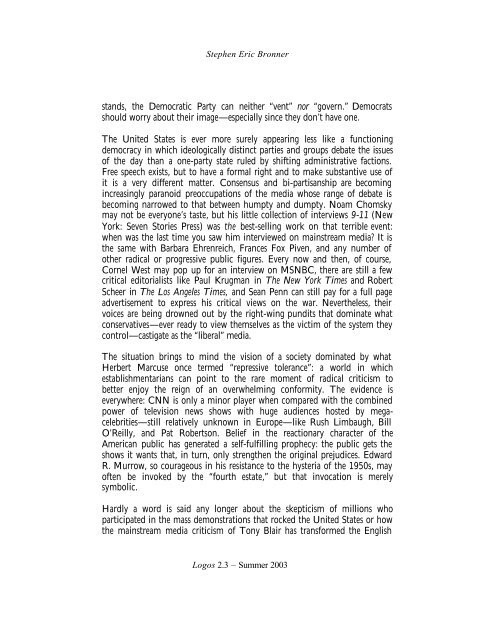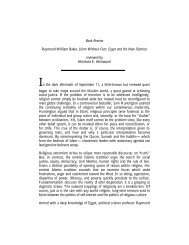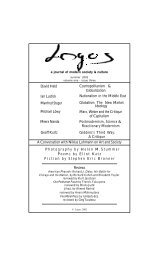Michael J. Thompson Stephen Eric Bronner Wadood Hamad - Logos
Michael J. Thompson Stephen Eric Bronner Wadood Hamad - Logos
Michael J. Thompson Stephen Eric Bronner Wadood Hamad - Logos
You also want an ePaper? Increase the reach of your titles
YUMPU automatically turns print PDFs into web optimized ePapers that Google loves.
<strong>Stephen</strong> <strong>Eric</strong> <strong>Bronner</strong><br />
stands, the Democratic Party can neither “vent” nor “govern.” Democrats<br />
should worry about their image—especially since they don’t have one.<br />
The United States is ever more surely appearing less like a functioning<br />
democracy in which ideologically distinct parties and groups debate the issues<br />
of the day than a one-party state ruled by shifting administrative factions.<br />
Free speech exists, but to have a formal right and to make substantive use of<br />
it is a very different matter. Consensus and bi-partisanship are becoming<br />
increasingly paranoid preoccupations of the media whose range of debate is<br />
becoming narrowed to that between humpty and dumpty. Noam Chomsky<br />
may not be everyone’s taste, but his little collection of interviews 9-11 (New<br />
York: Seven Stories Press) was the best-selling work on that terrible event:<br />
when was the last time you saw him interviewed on mainstream media? It is<br />
the same with Barbara Ehrenreich, Frances Fox Piven, and any number of<br />
other radical or progressive public figures. Every now and then, of course,<br />
Cornel West may pop up for an interview on MSNBC, there are still a few<br />
critical editorialists like Paul Krugman in The New York Times and Robert<br />
Scheer in The Los Angeles Times, and Sean Penn can still pay for a full page<br />
advertisement to express his critical views on the war. Nevertheless, their<br />
voices are being drowned out by the right-wing pundits that dominate what<br />
conservatives—ever ready to view themselves as the victim of the system they<br />
control—castigate as the “liberal” media.<br />
The situation brings to mind the vision of a society dominated by what<br />
Herbert Marcuse once termed “repressive tolerance”: a world in which<br />
establishmentarians can point to the rare moment of radical criticism to<br />
better enjoy the reign of an overwhelming conformity. The evidence is<br />
everywhere: CNN is only a minor player when compared with the combined<br />
power of television news shows with huge audiences hosted by megacelebrities—still<br />
relatively unknown in Europe—like Rush Limbaugh, Bill<br />
O’Reilly, and Pat Robertson. Belief in the reactionary character of the<br />
American public has generated a self-fulfilling prophecy: the public gets the<br />
shows it wants that, in turn, only strengthen the original prejudices. Edward<br />
R. Murrow, so courageous in his resistance to the hysteria of the 1950s, may<br />
often be invoked by the “fourth estate,” but that invocation is merely<br />
symbolic.<br />
Hardly a word is said any longer about the skepticism of millions who<br />
participated in the mass demonstrations that rocked the United States or how<br />
the mainstream media criticism of Tony Blair has transformed the English<br />
<strong>Logos</strong> 2.3 – Summer 2003




